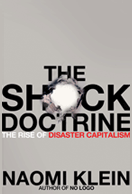The Shock Doctrine

Most of AIG's $160 Billion Bailout Went to Large Banks; Firm Also Spent $165 Million in Staff Bonuses
Hugh Son and Robert Schmidt, Bloomberg News, March 16, 2009
"American International Group Inc., under pressure to reveal how it spent billions of dollars in taxpayer funds since its September bailout, said $105 billion flowed to U.S. states and banks including Goldman Sachs Group Inc., Societe Generale SA and Deutsche Bank AG. Banks that bought credit-default swaps or traded securities with AIG got $22.4 billion in collateral, $27.1 billion in payments from a U.S. entity to retire the derivatives, and $43.7 billion tied to the securities-lending program, AIG said yesterday in a statement. States led by California and Virginia got $12.1 billion tied to guaranteed investment contracts....
"The disclosure may fuel a backlash over AIG’s bailout, valued at about $160 billion as of March 2, which has already drawn expressions of anger and frustration from Congress, Treasury officials and Federal Reserve Chairman Ben S. Bernanke. AIG was lambasted yesterday for awarding $165 million in retention pay to employees of the unit that sold the swaps, deals that helped trigger the global credit crisis. AIG has said it plans to spend as much as $1 billion to keep people from leaving as it sells units....
"Goldman Sachs led beneficiaries, with $12.9 billion, followed by SocGen, France’s No. 3 bank, with $11.9 billion, and Deutsche Bank, Germany’s biggest lender, with $11.8 billion."
Merrill Lynch's Executives Made Millions in 2008 While the Firm Lost Billions
Reuters, Reuters, March 4, 2009
"Merrill Lynch & Co's 10 highest-paid employees got a total of $209 million in cash and stock in 2008, up slightly from $201 million they received a year earlier, the Wall Street Journal said, citing reviewed figures.
"Andrea Orcel, the firm's top investment banker, was paid $33.8 million in cash and stock in 2008, the paper said... Eleven top executives were paid more than $10 million in cash and stock last year, the paper said, citing people familiar with the situation. Another 149 received $3 million or more, the paper said."
Bailed Out Banks Still Spend Billions on Campaign Donations
Silla Brush, The Hill, March 3, 2009
"The eight largest banks’ political action committees (PACs) spent roughly $225,000, not including operating expenses, between Nov. 25 and the end of January, according to a review of year-end and February filings with the Federal Election Commission. Those same eight banks have received $170 billion of the government’s $700 billion financial rescue package, passed in October and currently being reworked by President Obama’s administration....
"JPMorgan Chase & Co., which received $25 billion in bailout money last fall, was the largest bank contributor in the last two periods. The firm’s PAC spent roughly $87,000 since Nov. 25, including $5,000 to former Sen. Norm Coleman (R-Minn.), $5,000 for debt retirement to Sen. Mark Warner (D-Va.), $15,000 to the National Republican Senatorial Committee and $5,000 to the New Democrat Coalition PAC....
"Some of the leading trade associations representing the financial industry also have given hundreds of thousands since mid-November. The American Bankers Association PAC spent $132,000, and the Independent Community Bankers Association spent $106,000. The Securities Industry and Financial Markets Association PAC spent only $1,000, and the Financial Service Roundtable PAC spent roughly $17,000."
Defense Industry, Agribusiness Lobbyists Boost Efforts to Defeat Obama's Agenda
Brody Mullins and Scott Kilman, Wall Street Journal, February 26, 2009
"Industries from health care to agribusiness to mining that stand to lose under President Barack Obama's policy agenda are ramping up lobbying campaigns to derail or modify his plans....
"The agriculture lobby quickly recoiled Wednesday against President Obama's vow to 'end direct payments to large agribusinesses that don't need them,' though industry leaders and farm-state legislators weren't sure which government payments they'll have to defend....
"Even before Mr. Obama's speech, the defense industry had stepped up its advertising and lobbying efforts this week in response to the president's vow to crack down on defense-project cost overruns, and to separate proposals in Congress to cut off certain expensive weapons programs. Mr. Obama's criticism, industry officials fear, is a foreshadowing of deep cuts to come. The Aerospace Industries Association of America has spent $2 million so far on an ad campaign urging that defense spending shouldn't be slashed to offset shortfalls in other areas."
Lawyer Says Guantanamo Abuse Worse Since Obama
Luke Baker, Reuters, February 25, 2009
"Abuse of prisoners at Guantanamo Bay has worsened sharply since President Barack Obama took office as prison guards 'get their kicks in' before the camp is closed, according to a lawyer who represents detainees....
"He stressed the mistreatment did not appear to be directed from above, but was an initiative undertaken by frustrated U.S. army and navy jailers on the ground. It did not seem to be a reaction against the election of Obama, a Democrat who has pledged to close the prison camp within a year, but rather a realization that there was little time remaining before the last 241 detainees, all Muslim, are released.
"'It's "hey, let's have our fun while we can,"' said [Ahmed] Ghappour, who helped secure the release this week of Binyam Mohamed, a British resident freed from Guantanamo Bay after more than four years in detention without trial or charge. 'I can't really imagine why you would get your kicks from abusing prisoners, but certainly, having spoken to certain guards who have been injured in Iraq, who indirectly or directly blame my clients for their injuries and the trauma they have suffered, it's not too difficult to put two and two together'....
"Ghappour said he had filed two complaints of serious detainee abuse since December 22 but received no response from U.S. authorities. In one case his client had his knee, shoulder and thumb dislocated by a group of guards, Ghappour said."
Scientists Say Biotechnology Seed Companies Are Thwarting Research
Andrew Pollack, New York Times, February 20, 2009
Biotechnology companies are keeping university scientists from fully researching the effectiveness and environmental impact of the industry’s genetically modified crops, according to an unusual complaint issued by a group of those scientists....
"The problem, the scientists say, is that farmers and other buyers of genetically engineered seeds have to sign an agreement meant to ensure that growers honor company patent rights and environmental regulations. But the agreements also prohibit growing the crops for research purposes.
"So while university scientists can freely buy pesticides or conventional seeds for their research, they cannot do that with genetically engineered seeds. Instead, they must seek permission from the seed companies. And sometimes that permission is denied or the company insists on reviewing any findings before they can be published, they say....
"'If a company can control the research that appears in the public domain, they can reduce the potential negatives that can come out of any research,' said Ken Ostlie, an entomologist at the University of Minnesota."
SEC to Examine Boards' Role in Financial Crisis
Zachary A. Goldfarb, Washington Post, February 20, 2009
"Securities and Exchange Commission Chairman Mary Schapiro plans to look into whether the boards of banks and other financial firms conducted effective oversight leading up to the financial crisis, according to SEC officials, part of efforts to intensify scrutiny of the top levels of management and give new powers to shareholders to shape boards.
"As she examines what went wrong, Schapiro is also considering asking boards to disclose more about directors' backgrounds and skills, specifically how much they know about managing risk, said the officials, who spoke on condition of anonymity because no policy initiative has been launched....
"The boards signed off on the risks the companies took and the compensation packages awarded to top executives. But many corporate watchdogs say the boards of top financial firms had characteristics that promoted risky business practices and harmed shareholders....
"Watchdogs point to flawed boards at many firms -- including Countrywide, American International Group and Wachovia -- involved in the crisis. [Nell] Minow points out that at Bear Stearns, the compensation committee had nine criteria to decide on the chief executive's compensation, such as total return to shareholders and earnings per share. But in the end, it could choose to award the maximum compensation to the chief executive based on only one of the criteria."
Jobless Paying Fees to Banks When Collecting Unemployment Benefits
Christopher Leonard, Associated Press, February 19, 2009
"For hundreds of thousands of workers losing their jobs during the recession, there's a new twist to their financial pain: Even when they're collecting unemployment benefits, they're paying the bank just to get the money — or even to call customer service to complain about it.
"Thirty states have struck such deals with banks that include Citigroup Inc., Bank of America Corp., JP Morgan Chase and US Bancorp, an Associated Press review of the agreements found. All the programs carry fees, and in several states the unemployed have no choice but to use the debit cards. Some banks even charge overdraft fees of up to $20 — even though they could decline charges for more than what's on the card....
"With the national unemployment rate now at 7.6 percent, the market for bank-issued unemployment cards is booming. In 2003, states paid only $4 million of unemployment insurance through debit cards. By 2007, it had ballooned to $2.8 billion, and by 2010 it will likely rise to $10.5 billion, according to a study conducted by Mercator Advisory Group, a financial industry consulting firm."
Republicans Try to Block Guantánamo Detainees from Prisons in their Districts
Daniel Nasaw, Guardian, February 17, 2009
"Republicans in at least six states are seeking to block the White House from transferring Guantánamo Bay detainees to their districts, in what critics call an effort to stymie Barack Obama's efforts to close the prison.
"Congressional Republicans have introduced bills that would bar the government from moving any of the 250 inmates to some of the most prominent military and civilian detention centres in the US, including a "supermax" high-security federal prison in Florence, Colorado, which holds at least 16 convicted international terrorists, and a South Carolina naval brig that holds the only enemy combatant jailed in America....
"'If they think that US prisons can't hold terrorists without a good chance of those terrorists of running away and killing Americans, then I wonder why they haven't spent every waking hour of their lives in the Congress trying to fix that problem, considering that US prisons currently house some of the world's most dangerous convicted terrorists,' said Tom Malinowski, Washington director of Human Rights Watch."
Largest Banks That Received Aid Cut Lending
Christopher S. Rugaber, Associated Press, February 17, 2009
"The 20 largest banks that received government rescue funds slightly reduced their lending to consumers and businesses in the last three months of 2008, the government said Tuesday.
"The Treasury Department said the banks reduced their mortgage and business loans by a median of 1 percent each, while credit card lending rose by a median of 2 percent. The median is the point halfway between the banks that lent the most and those that lent the least.















